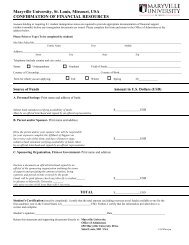The Tragedy of the Commons - The Garrett Hardin Society
The Tragedy of the Commons - The Garrett Hardin Society
The Tragedy of the Commons - The Garrett Hardin Society
You also want an ePaper? Increase the reach of your titles
YUMPU automatically turns print PDFs into web optimized ePapers that Google loves.
Fall 2001T HE S OCIAL C ONTRACTmutually agreed to pass lawsagains t robbing, mankind becamemore free, not less so. Individualslocked into <strong>the</strong> logic <strong>of</strong> <strong>the</strong>commons are free only to bring onuniversal ruin; once <strong>the</strong>y see <strong>the</strong>necessity <strong>of</strong> mutual coercion, <strong>the</strong>ybecome free to pursue o<strong>the</strong>r goals.I believe it was Hegel who said,“Freedom is <strong>the</strong> recognition <strong>of</strong>necessity.”<strong>The</strong> most important aspect <strong>of</strong>necessity that we must nowrecognize, is <strong>the</strong> necessity <strong>of</strong>abandoning <strong>the</strong> commons inbreeding. No technical solution canrescue us from <strong>the</strong> misery <strong>of</strong>overpopulation. Freedom to breedwill bring ruin to all. At <strong>the</strong> moment,to avoid hard decisions many <strong>of</strong> usare tempted to propagandize forconscience and responsibleparenthood. <strong>The</strong> temptation must beresisted, because an appeal toindependently acting consciencesselects for <strong>the</strong> disappearance <strong>of</strong> allconscience in <strong>the</strong> long run, and anincrease in anxiety in <strong>the</strong> short.<strong>The</strong> only way we can preserveand nurture o<strong>the</strong>r and moreprecious freedoms is byrelinquishing <strong>the</strong> freedom to breed,and that very soon. “Freedom is <strong>the</strong>recognition <strong>of</strong> necess ity” — and itis <strong>the</strong> role <strong>of</strong> education to reveal toall <strong>the</strong> necessity <strong>of</strong> abandoning <strong>the</strong>freedom to breed. Only so, can weput an end to this aspect <strong>of</strong> <strong>the</strong>tragedy <strong>of</strong> <strong>the</strong> commons. NOTES1. J. B. Wiesner and H. F. York, Sci.Amer. 211 (No. 4), 27 (1964).2. G. <strong>Hardin</strong>, J. Hered. 50, 68 (1959); S.vonHoernor, Science 137, 18 (1962).3. J. von Newmann and O. Morgenstern,<strong>The</strong>ory <strong>of</strong> Games andEconomic Behavior (PrincetonUniversity Press, Princeton, N.J.,1947), p.11.4. J. H. Fremlin. New Sci. No. 415(1964), p.285.5. A. Smith. <strong>The</strong> Wealth <strong>of</strong> Nations(Modern Library, N.Y. 1937) p.423.6. W. F. Lloyd, Two Lectures on <strong>the</strong>Checks to Population (OxfordUniversity Press, Oxford, England,1833), reprinted (in part) inPopulation, Evolution, and BirthControl, G. <strong>Hardin</strong>, Ed. (Freeman, SanFrancisco, 1964, p.37.7. A. N. Whitehead, Science and <strong>the</strong>Modern World (Mentor, New York,1948), p.17.8. G. <strong>Hardin</strong>, Ed. Population,Evolution, and Birth Control,(Freeman, San Francisco, 1964), p.56.9. S. McVay, Sci. Amer. 216 (No. 8), 13(1966).10. J. Fletcher, Situation Ethics,(Westminster, Philadelphia, 1966).11. D. Lack, <strong>The</strong> Natural Regulation<strong>of</strong> Animal Numbers (Clarendon Press,Oxford, 1954).12. H. Girvetz, From Wealth toWelfare (Stanford University Press,Stanford, California, 1950.13. G. <strong>Hardin</strong>. Perspectives in Biologyand Medicine, 6, 366 (1963).14. U. Thant. International PlannedParenthood News, No. 168 (February1968), p.3.15. K. Davis, Science 158, 730 (1967).16. S. Tax, Ed., Evolution AfterDarwin (University <strong>of</strong> Chicago Press,Chicago, 1960) vol. 2, p.469.17. G. Bateson, D. D. Jackson, J. Haley,J. Weakland, Behav. Sci. 1, 251 (1956).18. P. Goodman, New York Review <strong>of</strong>Books, 10 (8), 22 (23 May 1968).19. A. Comfort, <strong>The</strong> Anxiety Makers(Nelson, London, 1967).20. C. Frankel, <strong>The</strong> Case for ModernMan (Harper, New York, 1955), p.203.21. J. D. Rolansky, Genetics and <strong>the</strong>Future <strong>of</strong> Man (Appleton-Century-Cr<strong>of</strong>ts, New York, 1966), p.177.35
















